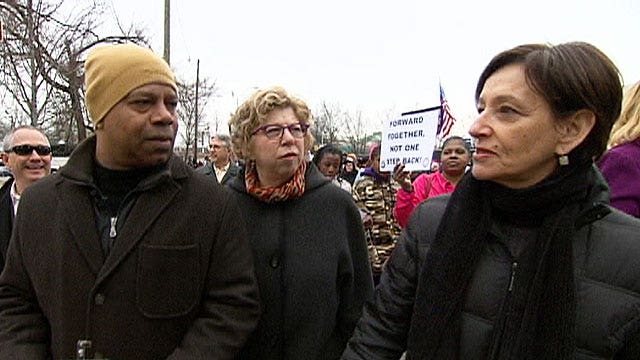Ever since Republicans won in a landslide in the 2010 midterm elections, the conventional view among pundits has been that the newly ascendant Tea Party is to blame for turning the country inward. Enough of that foreign policy “stuff” and fighting wars in strange lands, the real conflict is at home with an administration that is turning the U.S. into some form of European-style social democracy—or so goes the reasoning of the imagined Tea Partier.
There is obviously some truth this portrayal. But it falls short on two accounts.
The first problem is that it ignores that the president himself entered the Oval Office in 2008 determined to focus on his domestic agenda and, to do so, was even more determined to keep foreign policy issues from dominating the front pages of American newspapers.
Relations with Moscow and Beijing were to be reset in order to avoid great-power tensions, military deployments to Iraq were to draw to a close, and even Afghanistan, the so-called “good war,” was put on a timeline for concluding regardless of whether success there might need more time or more resources. Passivity in the face of the slaughter in Syria is not a new attitude on the part of the White House; it’s been part and parcel of the president’s foreign policy vision from day one.
No doubt, maintaining a forward-leaning foreign policy would have been difficult for any president given the mishandling of the Iraq war. But as the polls show, even as late as 2009, whenever the president spoke about the need for deploying more troops to Afghanistan, there was majority support for doing so. The problem was the president virtually stopped talking about the Afghan war except to say it was drawing to a close.
And now the president faces a revolt within his own party over one of his key remaining foreign policy initiatives—the free trade agreements with Europe (the Transatlantic Trade and Investment Partnership) and a dozen states of the Pacific-Asian rim (the Trans-Pacific Partnership). Neither pact is likely to pass absent bipartisan agreement within Congress to give the administration “trade promotion authority,” which would mean any negotiated agreement would face a simple up-or-down ratification vote by Congress. Failing that, with such complicated pacts as these, House or Senate efforts to modify bits and pieces would result in the whole deal coming undone as other nations, in turn, demand their own discrete changes to the agreement’s terms.
In his State of the Union address, the president asked that Congress give him that “fast-track” authority. But immediately after, Senate Majority Leader Harry Reid, a Democrat from Arizona, told reporters that he would do nothing to support such an effort and advised its supporters to not push now. Given how marginal the support for free trade within the Democratic Party is to begin with, Reid’s comments might not be all that surprising but they did deal a serious blow to the president’s hopes to bring these pacts to a conclusion this year.
In short, if America is indeed turning inward, it’s not accurate to hold the GOP’s newest crop of members of Congress solely responsible for this trend. There is plenty of blame to go around.
The bad news is that this situation cannot last much longer. Without American engagement and leadership, the world is increasingly becoming more chaotic and dangerous. Putin-led Russian revanchism continues to spoil efforts to stabilize the European periphery. Iran crows that the West has conceded to its right to a full-up nuclear program. Chinese President Xi’s “China Dream” apparently doesn’t include political liberalization at home but does include a more militaristic posture abroad. And disengagement from Iraq and Afghanistan and the lack of sustained engagement with the countries of the Arab Spring has not brought more stability, but less. If anything, militant jihadists are as numerous as they were prior to 9/11. At some point, these chickens will come home to roost and America’s leaders will once again be forced into dealing with the world as it is, not as they might hope it might become.
But on this front there is some good news. Although the headline to a recent Pew Research Center poll announced that a majority of Americans want the U.S. “to mind its own business internationally,” they also want, by a margin of 8 to 2, the U.S. to exercise global leadership—a margin that has held consistent since the end of the Cold War (as my AEI colleague David Adesnik has noted) and cannot help but include Tea Party members. Even today, the same Pew poll has a majority of Americans wanting the U.S. to remain the singular superpower on the world stage. In other words, there remains strong underlying public support for what has been America’s traditional role in the world since the end of the Second World War.
Of course, neither dark security clouds on the horizon nor a broad inclination on the part of Americans to sustain global leadership is sufficient to reverse the present course. That will require leadership from our elected leaders, properly interpreting the increased dangers we face and smartly drawing on that underlying support to articulate a sound strategy for meeting them. So far, we’ve seen too little of both.

